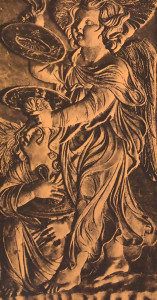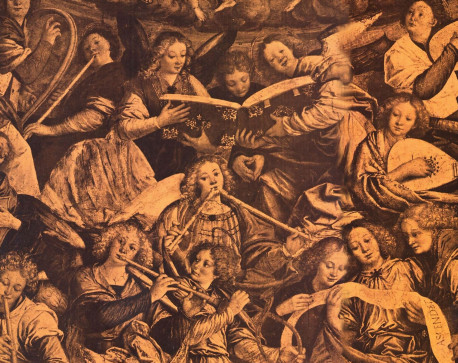Vedic knowledge can elevate a simple religious
sentiment to a profound transcendental realization.
by Kundali dasa
The Bible has nearly a hundred verses that praise the power, glory, and excellence of God’s hallowed name. The Bible’s authors obviously considered the holy name of the Lord very important. If we ask, however, why the name of the Lord is so glorious and praiseworthy, the Bible offers no explanation. The Vedic scriptures, on the other hand, not only glorify the holy name but also offer a systematic philosophical explanation of it and instruct us in its practical realization as well.
One may argue that for the person who faithfully accepts the authority of scripture, no rigorous theological explanation of the Lord’s holy name is required. This is certainly true. Nevertheless, it is a fact of our times that very few such persons exist. Most people do require some philosophical groundwork to support their religious convictions. Rarely indeed do we come across a person who accepts the scriptural injunctions with unshakable faith and yet doesn’t come off as an unreasonable, frothy-mouthed dogmatist or a syrupy sentimentalist.
Moreover, with the prevailing popularity of atheistic science, God and religion have become almost synonymous with superstition and tomfoolery. This situation has come about primarily because religious folk, especially in the Western world, are unable to put forward well-reasoned philosophical and scientific arguments to support their conclusions. Consequently, the task of convincing people in general about the efficacy of the holy name is more difficult than ever. We need a religious system that is both philosophically sound and scientifically verifiable. Without such a system, it is virtually impossible to combat the obstacles to faith in God and His holy name imposed by atheistic science and various speculative philosophies.
Clearly, a scriptural tradition that can stand the tests of philosophic scrutiny and scientific investigation would be superior to one that can’t. If, therefore, an objective analysis reveals one scriptural tradition to be more thorough and convincing than the others, then we should accept it, without being swayed by sectarian leanings. The idea is not one-upmanship; the idea is to destroy ignorance with the torch of knowledge. After all, light from any source is still light.
Nevertheless, experience tells me that persons with a sectarian religious outlook will write off my statements as sectarian. That attitude has a certain merit for such people: it makes their view the correct one, a priori, thus saving them the toil and bother of any further investigation. Others, however, will want to shelve partisan feelings and reservations pending a thorough analysis of the Krsna conscious precepts on this important matter.
The Vedic scriptures describe a complete theology of the holy name, encompassing its attributes, its effects, its practice, and its propagation. One fundamental precept of that theology is that because God is unlimited He has innumerable names. In other words, for each of His unlimited attributes and pastimes He has a name. For instance, He is called Jagannatha, the Lord of the universe; Paramatma, the Supersoul; Isvara, the supreme controller; and Krsna, the all-attractive person. In the Western tradition God also has many names: Yahweh, Jehovah, Shadday, Adonai, and Elohim, to name a few. They mean “the possessor of infinite wisdom,” “the possessor of infinite intelligence,” “the Supreme Lord,” “the Almighty,” and “God” respectively. These names are unfamiliar to most of us because translations of the Bible use in the main only “Lord” and “God.”
Another fundamental Vedic precept regarding the holy name is that the Lord and His names are identical. Unlike us, He is fully present in His transcendental names. How is that possible? The Lord is by definition unlimited and absolute. That means His name is also unlimited and absolute. To put it another way, God is perfect and complete and so is everything in relation to Him, including His holy name. “Perfect and complete” means that all the qualities we attribute to God are also found in His divine names.
That the Lord and His names are nondifferent and equally potent is confirmed in the Siksastaka, an eight-verse prayer composed by Caitanya Mahaprabhu.* He explains that any of the Lord’s names can bestow all good fortune upon a sincere chanter because the Lord, out of His mercy, has invested all His transcendental potencies in the sound of His name. Through His names He has made Himself easily available to everyone. Accordingly, the holy name is called the sound incarnation of the Supreme Personality of Godhead.
 The essential elements of this aspect of the theology are summed up in the following verse from the Padma Purana:
The essential elements of this aspect of the theology are summed up in the following verse from the Padma Purana:
The holy name of Krsna [God] is transcendentally blissful. It bestows all spiritual benedictions, for it is Krsna Himself, the reservoir of all pleasure. It is not a material vibration under any condition, and it is no less powerful than Krsna Himself. Since Krsna’s name is not contaminated by any material qualities, there is no question of its being involved with the mundane world. Krsna’s name is always liberated and spiritual; it is never conditioned by the laws of material nature. This is because the name of Krsna and Krsna Himself are identical.
Being identical with Krsna, the all-pure, the holy name can purify anyone who comes in contact with it. The example is sometimes given that just as the powerful sun can purify urine and filth and not become contaminated, so contact with the supremely pure holy name of God can purify the heart of even the most sinful, abominable person. This purifying power of the holy names is explained in the Srimad-Bhagavatam (6.2.18-19):
As a fire burns dry grass to ashes, so God’s name, whether chanted knowingly or unknowingly, burns to ashes, without fail, all the reactions of one’s sinful activities.
If a person unaware of the effective potency of a certain medicine takes that medicine or is forced to take it, it will act even without his knowledge because its potency does not depend on the patient’s understanding. Similarly, even though one does not know the value of chanting the holy name of the Lord, if one chants it, knowingly or unknowingly, the chanting will be very effective.
These two verses clearly indicate that the chanting of God’s hallow’d names is not only the most purifying activity, but it is also nonsectarian. It is a universal and absolutely beneficial spiritual exercise. The merciful holy name makes no distinction of gender, caste, culture, or creed. Lord Caitanya therefore praised the chanting process as “the prime benediction for humanity.”
How does it work? What are is effects? Regular hearing and chanting of the Lord’s holy names removes selfish desires from the heart. The pure, spiritual desire to render loving service to the Supreme Lord replaces them.
When an irrevocable desire for loving service is established in the heart of a sincere chanter, pernicious qualities such as lust, anger, envy, greed, lamentation, and illusion are destroyed. In that purified state he realizes the Personality of Godhead. In other words, he sees the Supreme Lord face to face. As the Bible says, “Blessed are the pure in heart, for they shall see God” (Mt. 5:8). Because the power of the holy name is verifiable in this way, the Vedic literatures describe chanting as vijnana, a scientific process.
Ultimately, perfection in chanting the holy name promotes the chanter to the spiritual world, the kingdom of God. There, in a spiritual body, he engages in direct devotional service to the Lord forever. This attainment is the professed goal of all the world’s major religions.
In addition to giving direct realization of the Lord and elevation to His transcendental abode, the chanting of the holy names of the Lord can immerse the chanter in a profound state of spiritual rapture. Sometimes these ecstatic states produce transformations in the body of an elevated devotee. Weeping and stammering are two of the symptoms of ecstatic love of God, Advanced devotees, however, do not wish to draw attention to themselves, so they try to contain these manifestations of their ecstasy.
The scriptures warn us against imitating exalted states of devotional ecstasy, explaining that a steady state of intense transcendental bliss is possible only for those who have progressed through all the antecedent stages in the chanting process. Lord Caitanya taught us how to derive the maximum benefit from chanting the holy name:
One should chant the holy name of the Lord in a humble state of mind, thinking oneself lower than a straw in the street; one should be more tolerant than a tree, devoid of a] sense of false prestige, and ready to offer all respect to others. In such a humble state of mind one can chant the holy names of the Lord constantly.
Following this teaching. Srila Prabhupada, the founder and spiritual master of the International Society for Krishna Consciousness, has advised us that “the great chanting for deliverance” should be done “like the genuine cry of a child for its mother.” Calling on the name of the Lord in this manner is sure to deliver the sincere chanter back home, back to Godhead. It should be noted, however, that the chanting still goes on even after one attains the liberated state.
Like the Bible, the Vedic scriptures attach utmost importance to the glorification of God’s divine names. Lord Krsna says in the Bhagavad-gita, “Of sacrifices I am japa, chanting of the holy names.” The Srimad-Bhagavatam says that although this quarrelsome age is an ocean of faults, it has one saving grace: by chanting the holy names of the Lord one can become free from material bondage and go back to the spiritual world. And the Brhan-naradiya Purana emphatically states that there is no means of God realization in this age save and except “chanting the holy name, chanting the holy name, chanting the holy name of the Lord.”
As for propagation of the holy name. the scriptures declare that chanters who work to this end are the nearest and dearest among the Lord’s devoted servants. They are described as the most munificent welfare workers in human society because their contribution is for everyone’s eternal well-being. Lord Caitanya Mahaprabhu therefore ordered that the chanting of the holy names be distributed to every town and village on the globe.
In pursuance of His order, the Krsna consciousness movement is determinedly preaching the chanting of the Hare Krsna mantra all over the world. This particular combination of names—Hare Krsna. Hare Krsna. Krsna Krsna, Hare Hare/ Hare Rama. Hare Rama, Rama Rama. Hare Hare—is recommended because it is especially effective in purifying the heart. However, any genuine name or combination of God’s names will produce the desired effect.
From the preceding discussion, a discerning reader can easily understand that the philosophy of Krsna consciousness gives profound depth and meaning to the familiar phrase “hallowed be Thy name.” The natural result of this understanding is that one feels inspiration to dedicate oneself to the practice and propagation of the holy name. Gradually, with perseverance and practice, one will get first-hand realization of its meaning.


Basically this article says Christianty is like Hare Krishna;
1.In the Western tradition God also has many names: Yahweh, Jehovah, Shadday, Adonai, and Elohim, to name a few. They mean “the possessor of infinite wisdom,” “the possessor of infinite intelligence,” “the Supreme Lord,” “the Almighty,” and “God”
2.the Vedic scriptures attach utmost importance to the glorification of God’s divine names.
How can Christian Gods can be same as Krishna? Certainly, they believe in Christian fundamental belief i.e. human being is born sinner and only will be redeemed if go the shelter of Jesus. whereas, in Hindus or Krishna Conscious, Human being is born as Sat Chit Anand.
It is wrong to equate any aspect of Christianity or any Abrahamic religion with Hinduism. IT SHOULD BE AVOIDED AS YOU ARE KILLING THE SPIRIT OF HINDUISM/KRISHNA.